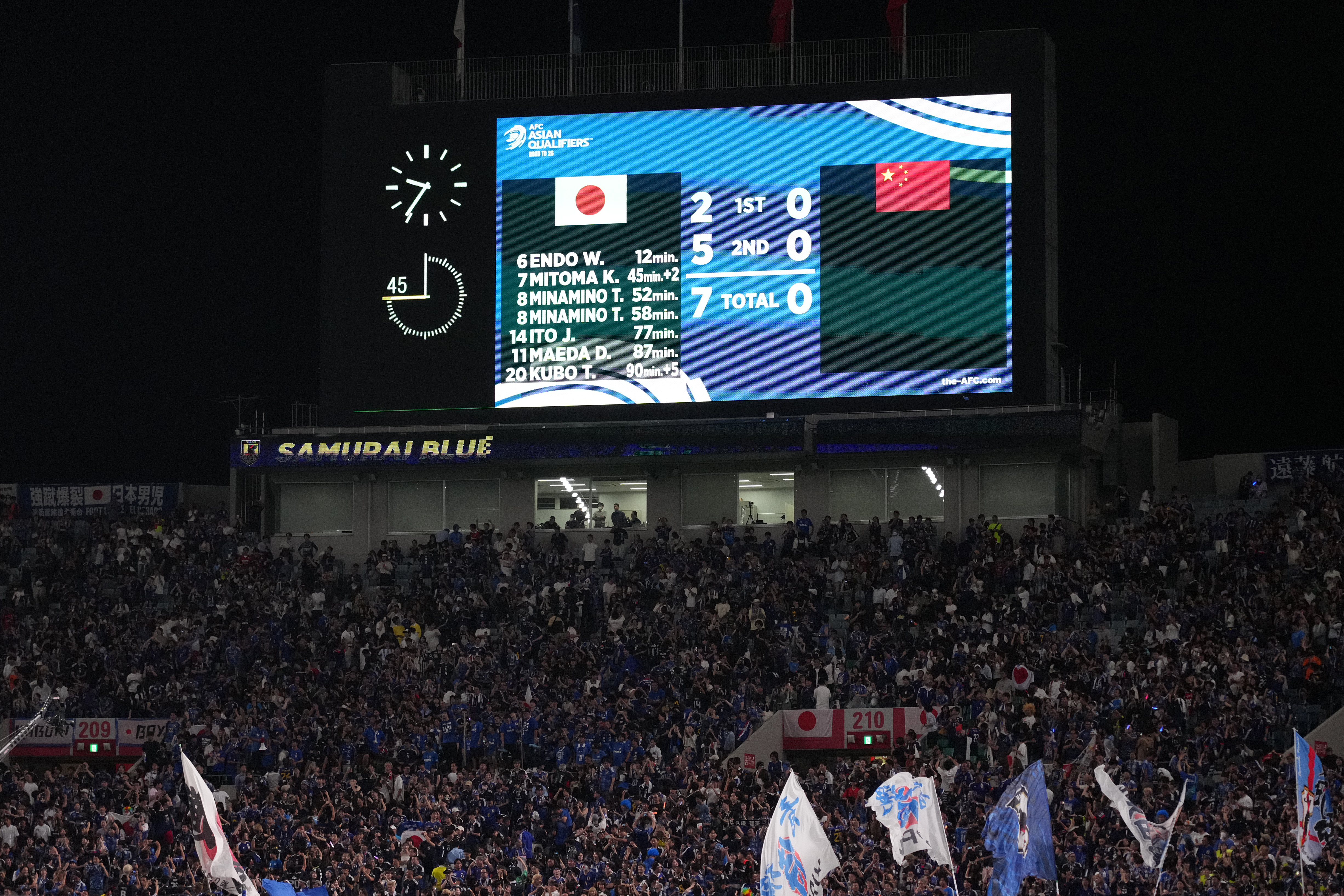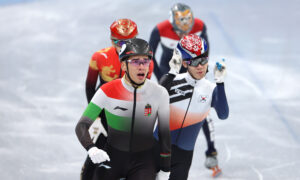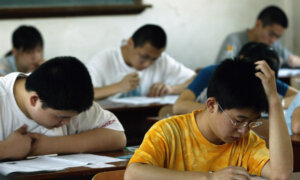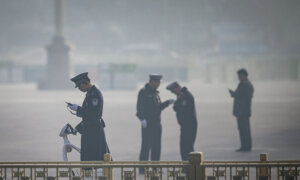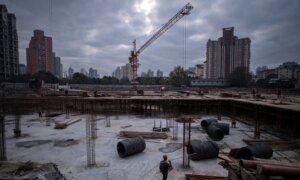Analysis
As exemplified by the recent 0-7 loss to Japan, despite receiving big money and strong support from the communist regime, the Chinese national soccer team’s performance has been abysmal.
Alongside this, the soccer industry in China has also been plagued by corruption and scandals involving betting operations.
The two problems are highly connected, according to experts—and are symptomatic of how the communist regime’s culture stifles the sporting industry.
On Sept. 5, China lost to Japan in the FIFA World Cup 2026 Qualifiers by 0–7, a loss that was described as humiliating by commentators on Chinese state media. China only qualified for the World Cup once in 2002 but was eliminated in the group stage after losing three matches and scoring zero goals. Online footage has shown angry Chinese fans screaming expletives toward the Chinese Football Association upon the return of the Chinese national team in Beijing.
Historically, the Chinese men’s soccer team has performed badly against Japan, winning only once in the past 20 years despite the Chinese Communist Party’s (CCP) massive investments in soccer. Currently, China is 91 in the latest FIFA ranking, four places lower than its previous position in July.
Soccer was one of the first sports commercialized in the country. Chinese state TV channels regularly broadcast matches from various European leagues, as the sport commands a large fan base in China. Sports betting is also popular, but only bets made through the China Sports Lottery are legal. Online betting and betting with foreign bookkeepers are both illegal.
Nevertheless, the Chinese soccer industry has been plagued by illegal betting in the past, with many high-level officials being implicated.
On NTD’s Chinese-language program “Pinnacle View,” insiders exposed the deep-rooted systematic corruption in Chinese soccer involving illegal betting and the participation of regime officials in such activities.
Betting Scandals
Days after the humiliating loss to Japan, the Chinese regime punished
61 individuals for their participation in illegal betting and fixed matches. Chinese state media reported that since 2022, the police shut down 12 online gambling rings and uncovered 120 fixed games, implicating dozens of players, managers, referees, and club executives.
The deputy director of China’s Public Security Bureau, Zhang Xiaopeng, said on Sept. 10 that investigations into illegal betting and bribery involving soccer players, coaches, and club managers are still ongoing.
Hu Liren, a former Shanghai businessman who was familiar with the local soccer industry, said on “Pinnacle View” that members of China’s public security apparatus were behind betting operations and fixed matches in Shanghai.
“In Shanghai, the police are the main backers of the football betting rings,” he said. “I even know specific officers who hold shares in these underground operations. These individuals are not just complicit; they are the driving force behind the corruption.”
During the 2022 FIFA World Cup, Chinese state media reported that Shanghai police busted 26 illegal betting rings and seized 13 million yuan (US$1.85 million) in illegal funds.
Hu explained that soccer in China has become a playground for illegal activities, far removed from any sense of fair competition.
Nationalist Outrage
Shi Shan, a China expert and an Epoch Times contributor, noted the political undertones surrounding China’s 0–7 loss to Japan in the World Cup Qualifiers. The game took place just two days after China’s official commemoration of the victory over Japan in World War II. Under the CCP, the regime has constantly pushed anti-Japan propaganda and rhetoric, and the soccer loss to Japan fueled the ultranationalistic fervor that surrounds Sino-Japanese relations.
Hours before the match, Chinese state television announced that it would not broadcast the game, which was inconsistent with past norms. Shi believes that the decision was made to avoid the humiliation of broadcasting an expected defeat to Japan, particularly after the regime had just celebrated its victory over its historical rival. The game’s outlook wasn’t promising; Japan ranks 16 in the FIFA Rankings, compared to China’s 91.
Hu said that the loss was not surprising to insiders. “Chinese football officials knew going into the match that there was no chance of winning against Japan, a team now ranked among the top 20 in the world,” he said. “It wasn’t just a failure on the field, but a reflection of the mismanagement and corruption that have crippled the sport.”
Corruption from Top to Bottom
Corruption in Chinese soccer is not limited to betting operations. According to Hu, the entire system is tainted, from player selection to match outcomes.
“Almost everyone involved with the sport, from coaches to officials, is involved in betting,” he said. “Those who control the game are not the athletes or fans but corrupt officials with vested financial interests.”
Corruption has frequently surfaced in China’s soccer industry. In January, China’s state broadcaster exposed a web of corruption within the soccer community, implicating over 10 high-ranking and mid-level officials. Last year, the head of the Chinese Football Association was arrested on corruption charges.
Li Jun, an independent Chinese television producer, said on “Pinnacle View” that China’s soccer industry is entangled with the regime’s bureaucratic system.
“Combining market forces with a corrupt bureaucracy was a recipe for disaster,” he said. “From selecting players to determining who gets to play in games, everything is influenced by money rather than merit. Every position, from referees to forwards, has a price. It’s not about talent or skill anymore—it’s about who can pay the most.”
The result is a system where athletic development has stalled, and young talent is stifled by a pay-to-play environment that prioritizes financial gain over athletic achievement.
A Systemic Issue Beyond Soccer
The problems in Chinese soccer are symptomatic of broader issues within the CCP’s governance and approach to sports. While corruption is rampant, it is part of a larger issue that plagues Chinese sports as a whole. According to Shi, the CCP’s obsession with uniformity and standardization drag down China’s soccer performance.
“The CCP has created a culture where everything must conform to a single standard, from management to athletic training,” Shi told The Epoch Times. “In soccer, this means players are selected based on rigid criteria such as height and speed, while creative talents who don’t meet these standards are pushed aside.”
He believes that this standardization is stifling innovation and creativity in the sport since many of the world’s greatest soccer players, like Pelé, Maradona, and Messi, would not meet the strict height or speed requirements in China’s soccer system. In the past, Chinese state media reported some of the requirements, such as that no players shorter than 180 cm (5’11) may train and play in overseas clubs.
This rigid approach extends to tactical decision-making as well. Coaches are expected to follow prescribed strategies with little room for improvisation, which limits players’ ability to adapt on the field, according to Shi, who said that this lack of flexibility is one of the reasons the Chinese soccer team continues to struggle on the international stage.

